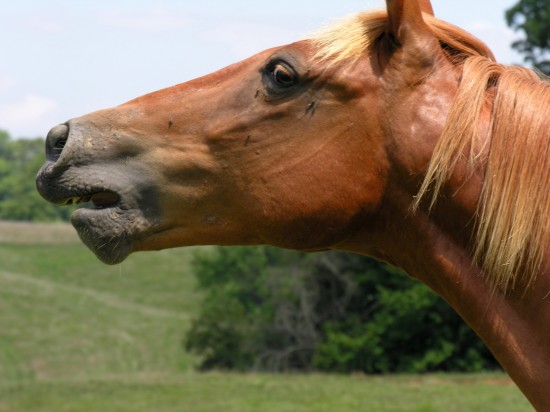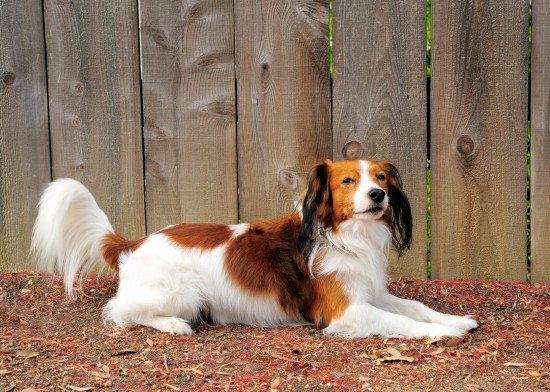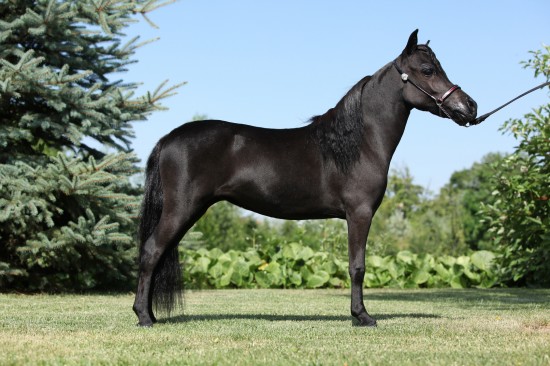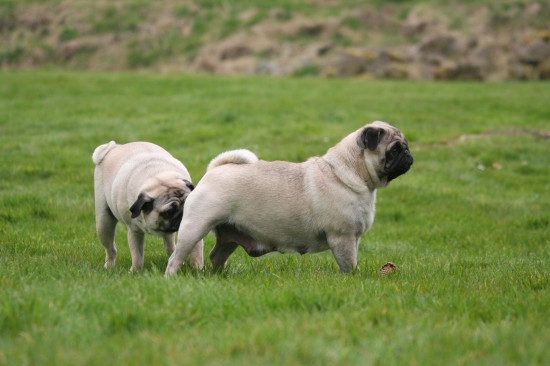

Finally, the summer is here and its a wonderful time of the year. However, with the lovely warmer weather and those long evenings comes the dreaded problem of flies, midges and many other sorts of biting insects. Unfortunately hot weather and flies go hand in hand where horses are concerned. The problem being that flies attack horses is so many different ways which means you've got to be prepared for them. If you know how to deal with a fly problem it makes it a lot easier to cope and this in turns means both horse and owner can appreciate the warmer weather than much better.
Biting flies are a real menace around horses and can be the cause of many an accident. Flies pierce the skin and then feed on the horse's blood – this naturally irritates the horse and some may even take off to get away from the bite!
Flies gather around a horse's eyes, mouth, nose and other very sensitive areas of the body. These flies secrete all sorts of things which cause more irritation to horses – they are a real nuisance both for horse and rider!
Fly bites can cause an allergic reaction in horses – something to be really careful of when out riding or even when competing – the hotter a horse gets, the more they sweats which then attracts even more flies making the situation even worse!
Anyone who has spent any time around horses knows about the worst offender of all – the horsefly (Tabinidae). These pesky creatures appear as soon as the weather heats up – around June and thereafter until the weather gets cooler again. They are busiest on warmer, sultry days and are commonly found around woodland or moist areas. These insects can really attack horses, biting their bellies, legs, necks and withers. They will also bite anyone who happens to be around horses at the time.
Horse fly bites are nasty and come up like lumps with a characteristic ulcer looking middle to them. The best way to avoid your horse having to cope with the affects of an attack is to stable them when you know there are horse flies about. Horse flies don't like dark areas and will not follow a horse into a darker stable.
Unfortunately, horse flies are resilient insects which means many home-made insect repellents don't work that well on them. However, any insecticide that contains pyrethroids (Permethrin or Cypermethrin) does work pretty well. They offer horses some protection against horse flies and you can buy them from good horse or agricultural suppliers. However, you must read the instructions very carefully because a few of the insecticides on the market are not suitable for daily use on horses.
Black flies in the summer can be a real problem for both riders and their mounts as well as horses grazing in paddocks during the day. They are little flies – around 2mm to 5mm in size and they breed really quickly in flowing water. The flies first appear at dawn and then again at dusk, when the weather starts to warm up in the spring and early summer. The best way to avoid them annoying your horse is to make sure your horse is stabled when the sun comes up and then again at sunset.
Black flies are really annoying and feed around a horse's face – they particularly like ears which can drive horses crazy. However, they also bite horse's necks and their bellies, leaving painful lumps which bleed and then scab over – this of course attracts more flies making the situation even worse.
The best way to deal with black flies is to get hold of some sort of synthetic pyrethroid fly spray which acts as a good deterrent. However, physical barriers like ear nets and oil based products work well too. One popular solution contains oil of citronella which puts flies off landing on horses in the first place. The other thing to use is petroleum jelly (Vaseline) which you can apply to the inside of your horse's ears to stop the flies from biting them – making sure you do this very gently and remember some horses do not like their ears being touched!
Midges are tiny flying nuisances that are only 1mm-3mm long. They hover in swarms first thing in the morning at dawn and then again as the sun sets at dusk. They lay their eggs in still water which means you have to avoid creating any stagnant areas in a yard and to avoid having horses out in paddocks that are too near to any still water – the perfect breeding ground for midges to thrive in!
There are a few different species of midges and they feed on various parts of a horse's body. More commonly, horses are seen to rub away both their manes and the tops of their tails which can exacerbate another condition called sweet itch – this is when horses are allergic to insect bites and can rub themselves raw which then gets infected and extremely painful.
An effective way of keeping midges at bay is to use insect repellents that are permethrin based and to apply them late in the afternoon. Again, any oil based product is useful at preventing the midges from biting and causing all the damage. A lot of riders like to use bath oil mixed with water with a ratio of 50:50 and to apply it several times a day to stop the midges from landing on their horses.
By far the best way to prevent your horse from being attacked by midges, is to bring them in just before dusk. Another good method of keeping midges at bay is to use lightweight fly sheets. These can be very useful at keeping the midges away from your horse when they attack the most.
Stable flies are really annoying. They lay their eggs in anything moist found around a yard. This includes rotting vegetation like silage or hay that has your horse has urinated on. Horse droppings are the other favourite place for the flies to lay their eggs, which is why it's so important to make stable hygiene such a high priority. These flies feed around horse's legs and bellies where they bite causing a lot of irritation and painful wheals which have scabs in the centre.
The best way to avoid having too many stable flies around a yard is to keep everything as clean as possible. However, hanging fly traps helps and using a fly repellent containing permethrin is also an effective deterrent. You need to spray your horse's legs – making sure you do so carefully and without spooking your horse. If they object to the spray, then spray the repellent on a sponge and wipe the legs over with the repellent and do so several times a day.
We all love the summer, it's a wonderful time of year for both riders and horses. However, the eternal fly problem can turn a great day into a real disaster if you're not ready and able to cope with the situation. Being prepared with all the right repellents goes a long way when it comes to enjoying what is the best time of the equine year!
 Ten Uncommon Dog Breeds You Might Not Have Heard Of
Ten Uncommon Dog
Ten Uncommon Dog Breeds You Might Not Have Heard Of
Ten Uncommon Dog
 The Miniature Horse
The Miniature Hor
The Miniature Horse
The Miniature Hor
 An Exercise In Exercise Patient: Why The Dog Is Banned From Future Workouts
Although the dog is just a bit overweight, she is no lon
An Exercise In Exercise Patient: Why The Dog Is Banned From Future Workouts
Although the dog is just a bit overweight, she is no lon
 Picking The Right Pet For You - How Much Care Do Different Animals Need?
Picking The Right
Picking The Right Pet For You - How Much Care Do Different Animals Need?
Picking The Right
 Why Do Dogs Sniff Other Dog’s Bottoms ?
Why Do Dogs Sniff
Why Do Dogs Sniff Other Dog’s Bottoms ?
Why Do Dogs Sniff
Copyright © 2005-2016 Pet Information All Rights Reserved
Contact us: www162date@outlook.com